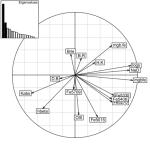Estimation of cosmological parameters using adaptive importance sampling
1 : Laboratoire traitement et communication de l'information
(LTCI)
-
Site web
CNRS : UMR5141, Institut Télécom, Télécom ParisTech
46 Rue Barrault 75013 PARIS -
France
We present a Bayesian sampling algorithm called adaptive importance sampling or Population Monte Carlo (PMC), whose computational workload is easily parallelizable and thus has the potential to considerably reduce the wall-clock time required for sampling, along with providing other benefits. To assess the performance of the approach for cosmological problems, we use simulated and
actual data consisting of CMB anisotropies, supernovae of type Ia, and weak cosmological lensing, and provide a comparison of results to those obtained using state-of-the-art Markov Chain Monte Carlo (MCMC). For both types of data sets, we find comparable parameter estimates for PMC and MCMC, with the advantage of a significantly lower computational time for PMC. In the case of
WMAP5 data, for example, the wall-clock time reduces from several days for MCMC to a few hours using PMC on a cluster of processors. Other benefits of the PMC approach, along with potential difficulties in using the approach, are analysed and discussed.
actual data consisting of CMB anisotropies, supernovae of type Ia, and weak cosmological lensing, and provide a comparison of results to those obtained using state-of-the-art Markov Chain Monte Carlo (MCMC). For both types of data sets, we find comparable parameter estimates for PMC and MCMC, with the advantage of a significantly lower computational time for PMC. In the case of
WMAP5 data, for example, the wall-clock time reduces from several days for MCMC to a few hours using PMC on a cluster of processors. Other benefits of the PMC approach, along with potential difficulties in using the approach, are analysed and discussed.


